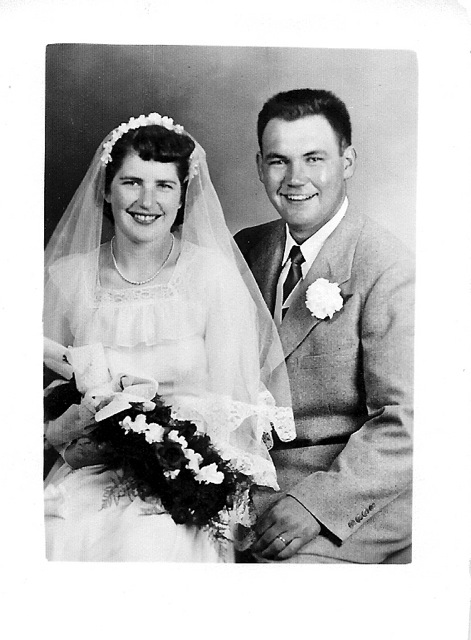Had I been thinking straight way back in June, when I posted a chapter from Lessons from My Father, this would have been the chapter to start with. Now that I am thinking straight and you’re scratching your head about where my parents’ story began, the answer can be found below. Ladies and gentlemen, it’s my pleasure to introduce the bride and groom to you: Harlan and Dorothy Stratton.
The Perfect Picture
And he said,
Naked I came from my mother’s womb,
And naked I shall return there.
The Lord gave and the Lord has taken away.
Blessed be the name of the Lord.
Job 1: 21
“Hello, world, here I come!” he seems to shout from his wedding picture. His broad grin turns his cheeks into plump apples, the dress suit hanging awkwardly on his 250 pound frame. “I’m in here just to humor her,” the twinkle in his eye seems to say. “Just a few more pictures, and I’ll be knee deep in manure again.”
“How will I keep up with him?” her shy smile asks the camera. Wearing her sister’s wedding dress, she looks stylish and petite, but slightly out of place. Her hands, rendered large as a man’s by years of milking, are hidden by her bouquet, her muscular arms covered by bridal lace. “I’d rather be in the barn,” she whispers to the generations gazing at her face.
Exuberant and ready to embrace rural life in the 1950s, they faced the photographer’s camera with confidence. With a honeymoon highlighted by a Chicago Cubs game and a tour of the Chicago Stockyards, could they be anything but Midwestern farmers? A registered Shorthorn breeding business needed building when they returned. They were ready to live the dream they had planned and worked for since they had met in college three years before. They would farm in partnership with his parents, Cyril and Fern, a loving couple who doted upon their only child, my father. They would raise a family, a big family, with lots of kids to help on the farm and keep one another company. They were young, strong, talented, and willing to do all that was necessary to realize their dreams. It was June 3, 1951. Harlan and Dorothy Stratton had the pieces of their married life collected and ready to assemble into a wonderful picture. Over the next thirteen years, like a jigsaw puzzle in reverse, the pieces disappeared, snatched away until none remained.
The picture, at first, came together just as planned. My father and his father quickly built up a herd of Shorthorns. They were poised to provide quality stock to farmers all over the Midwest. My parents had their first child, Jill, in 1953, and she was the apple of her grandparents’ eyes. Then, Fern’s health took a turn for the worse, and everything changed. Her colon cancer progressed at an alarming pace, and the resulting medical bills threatened to devour the farm. Harlan and Cyril dissolved their farming partnership and sold their assets, so that both families were not ruined. That was in 1954. The first piece of the perfect picture was gone.
In 1955, the second piece was removed. Fern Stratton died of colon cancer after a long and agonizing struggle. She was fifty-five years old.
Life as farmers denied them, the couple decided to do the next best thing. Harlan would pursue a career in the Extension Service, through which he could stay close to agricultural life, rubbing elbows with the farmers who tended the fields and animals he loved. Harlan’s exuberance and skill made him a popular and effective county agent. He advanced rapidly in a career to which his personality, training, and experience were perfectly suited. He read voraciously, mostly about agriculture, his nearly photographic memory adding book knowledge to the practical experience he gained working throughout the county. He spent his days traveling the countryside, consulting with farmers about their crops and livestock, providing for them the latest research available from Iowa State University, a land grant college founded to assist the development of agriculture. His expertise with cattle brought him numerous opportunities to train farm kids in the art of showing cattle and made him a sought-after cattle judge at many county fairs.
Dorothy was a busy mother and housewife. She was content to support her husband, complementing his gregarious personality with her own shy competence. She enjoyed basking in the shadow of Harlan’s successes, dedicating herself to her family, which had grown to two when I was born in 1956. Whenever she had the chance, she took education classes at the nearby college. She wanted to complete her four-year teaching degree to become one of the first in her family to graduate from college. “Besides,” she told the housewives who questioned her drive to get her bachelors degree, “it’s a good thing to have, just in case I ever need it.”
Just as they settled into their new lives in Malvern, Iowa, where Dad was the new county extension agent, a doctor pulled away another piece of the puzzle in 1958. Harlan had ignored coordination problems and double vision that came and went for several years. When he couldn’t pass the vision screening for his driver’s license test, he finally went to the doctor. The diagnosis of multiple sclerosis and its rapid debilitating progress nearly robbed him of his will to live.
By 1960 few fragments of the picture remained. Harlan, now the father of two girls and one red-haired boy named John, couldn’t work anymore. He couldn’t show cattle. He couldn’t walk without assistance. He couldn’t drive, couldn’t write, couldn’t see well enough to read, couldn’t even tell if his bladder was full or empty. He was thirty-one years old.
By 1966 the last piece of the picture they thought would be their life together was snatched away. Harlan’s father, Cyril, died at age sixty-seven, his mind and body destroyed by diabetes.
Gone.
The whole picture was gone through no fault of their own. If any couple had a reason to be bitter, my parents did, especially my dad, one of the nicest guys you’d ever care to meet. This man did everything right…honored his parents, went to church every Sunday, played with his kids, worked hard, never said “Bah, humbug” at Christmas. Sure, he ate red meat, but he was a cattle farmer, and this was the 1950s. My mom was right up there with him in nice woman status…studied hard, was a dedicated school teacher, treated her in-laws like gold, rolled out pie crust at the county fair when she was nine months pregnant. Anybody who knew them would say, “They didn’t deserve this.”
So, did they become bitter? Did they tear up the wedding picture of the ignorant young couple so unaware of the pain awaiting them? I’m sure they wanted to, but they didn’t. Instead they looked at that wedding picture and noticed, hiding in the depths of my mother’s gaze and in the laugh lines on my father’s face, the beginnings of a second picture. This new picture was different from the one they had imagined, as tragic as the first one had been hopeful.
In my mother’s eyes glinted a determination to provide for her family, and inside her heart dwelt an extraordinary talent for teaching children, a potent combination that caused schools to snatch her up. In my father’s face were hidden laugh lines attached to invisible strings, pulling his face into a haunted grin, giving him an ability to face his family and the world with a smile, even when his mind was heavy with depression and loss. They stared at this new picture and saw themselves, not as innocent victims, but as confident victors. Over the years, they labored to piece together the new picture of their lives.



Great story, one question who is “Jill”?
When my husband John & I were married in July, 1968, we weren’t expecting a predictable future. Viet Nam was the reality we faced. He went there in June, 1970, came back in May, 1971. He seemed to be in one piece. That’s when we felt our lives really began. The first postwar years were good. He got a good job, we bought the house I still live in, & we started preparing for the family we wanted desperately. But I was infertile & it was 1980 before our first child made it (2 misses & years of medical treatment before then), 1992 before the second (3 more misses & another decade of medical treatment). By then, his job situation was much poorer. His field had been inside sales of fasteners for a mostly military & aerospace market which the end of the Cold War had killed. He never had another decently paying job. On top of that, his parents, by then in their 80s, needed our care. John had developed diabetes. Last was no surprise; both parents had had it, tho they didn’t get it til their 70s & it was ever a major issue. John’s diagnoses @ age 40 was, he thought, a genetic double whammy. We had no reason to think otherwise; he’d tested negative for Agent Orange some years earlier.
John’s health held up thru a ten-year siege of ten years of caregiving & series of unsatisfactory jobs. Latter was much like people are facing now. Once his parents died, a year apart, the diabetes complications he’d had took their toll. To make a long story short, he spent his last decade suffering from everything diabetes offered, except for a stroke. Amputation, kidney & heart failure, partial blindness and, worst of all, constant, intractable pain.
That’s what separates men from boys, women from girls. I can’t say that I didn’t lash out just as much as he did. I spent too many nites sleep-deprived from his pain. I tried so hard to keep him going. Fortunately, he appreciated my efforts to keep him involved in life outside his pain. And the love and affection were always, always there.
His death, on Labor Day weekend 2011, fortunately, was easy & quick. His tired heart simply stopped beating one day while I was out running usual Friday errands @ bank, supermarket, etc.I came home, our DIL in two (I’d run into her while out shopping) & it was she who found him lying prone on the bathroom floor. It appeared he’d had a weak spell while in the bathroom & lay down to wait it out. Huge shock, little surprise. Much as there are times when I wish he were still living, even if he were sick, I’ve comfort in knowing there was nothing I could’ve done to prevent it. (The coroner stressed that very point as well after she finished her exam.) Staying alive would’ve been no kindness either. I’m just grateful we had no trauma & no decisions to make as to what plugs to pull.
Even more, he’d left us well provided for. Death & disability restored our finances after 15 years of poverty. He managed these new resources wisely & well. I have a modest but comfortable income, a paid-up house. He’d truly taught me to be a widow. I knew exactly whom to call, in what order, & what & where the necessary paperwork was.
I’m now 67, in good health, with plenty of energy. I’ve been able to repair our house, travel, help out @ church & in my community, enjoy hobbies & an active family & social life. But I’m intensely lonely I want him to share in my activities. The one satisfaction is that I tried very hard to honor the promise to love him “in sickness and health.”
Your mom did far better.
That would be my big sister. Because of her occupation, she doesn’t want her first name used. Thanks for asking cousin!
Thanks for sharing your story, Frances. You and my mom would have a lot to talk about. She did very well, but it was never easy. In fact, a few times it almost broke her. But I am thankful that she, like you, honored her marriage vows and cared for Dad for 38 years after his diagnosis. The last 14 years, Dad was in a nursing home, and she visited him faithfully.